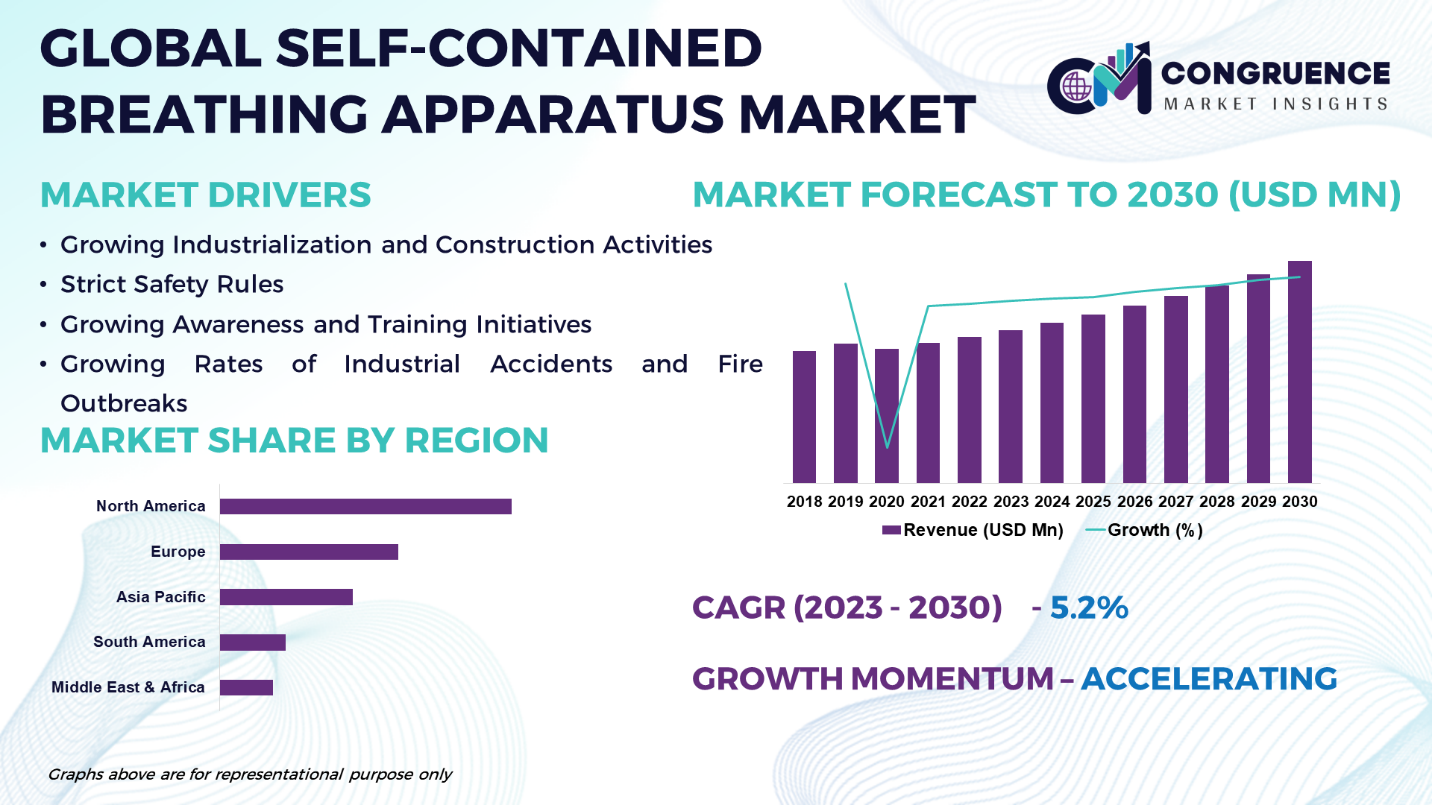Reports
The Global Self-Contained Breathing Apparatus Market is expected to expand at a CAGR of 5.2% between 2023 and 2030. The industry that deals with the manufacture, marketing, and distribution of self-contained breathing apparatus devices is known as the Global Self-contained Breathing Apparatus (SCBA) Market. When working in hazardous areas with poor air quality, firemen, rescue workers, industrial staff, and others need respiratory protection. SCBAs are essential pieces of equipment for these situations. The market includes a range of SCBA system types, including as open-circuit and closed-circuit devices, all of which are intended to give users access to clean air for a set amount of time so they may operate safely in situations where there is smoke, hazardous gasses, or low oxygen levels. Typically, these devices are made up of a compressed air cylinder, a regulator, a face piece, and a few more parts. The global SCBA market is expanding due to a number of factors, including rising workplace safety awareness, strict laws requiring the use of respiratory protection equipment, technological advancements improving product features and performance, and rising demand from sectors including construction, oil and gas, chemical, and firefighting.

Self-Contained Breathing Apparatus Market Major Driving Forces
Growing Industrialization and Construction Activities: The SCBA market has a lot of prospects due to the growing industrialization and construction activities in emerging economies. The need for SCBA devices in these industries is being driven by the increased emphasis on worker safety that results from the construction of new infrastructure and the expansion or refurbishment of existing facilities.
Strict Safety Rules: The adoption of SCBA equipment is being driven by the introduction of strict safety rules by government agencies and regulatory bodies worldwide. Adherence to safety regulations necessitates the utilization of dependable respiratory protective gear, thereby fostering an advantageous atmosphere for industry expansion.
Growing Awareness and Training Initiatives: End users' demand is being driven by their growing understanding of the value of workplace safety and the advantages of utilizing SCBA equipment. Enhancing market penetration and creating a safety culture across sectors are training initiatives and instructional programs that support the appropriate use and maintenance of SCBA systems.
Growing Rates of Industrial Accidents and Fire Outbreaks: The demand for SCBA equipment is being driven by the increasing number of fire breakouts, industrial accidents, and emergency scenarios that occur worldwide. SCBA equipment is used by firefighters, emergency responders, and industrial personnel to shield themselves from respiratory risks such as smoke inhalation and hazardous gasses during firefighting, rescue operations, or industrial events. One of the main factors driving market expansion is the requirement for efficient respiratory protection in such high-risk conditions.
Self-Contained Breathing Apparatus Market Key Opportunities
Technological Developments: Opportunities for market expansion are presented by the continuous advancements in SCBA technology, which include enhancements in material composition, ergonomic design, and integrated communication systems. Manufacturers who make R&D investments to improve product performance, longevity, and user comfort stand to benefit from increased market share and increased customer demand.
Demand from the Healthcare Industry: With the COVID-19 pandemic, in particular, the healthcare industry offers a new market opportunity for SCBA devices. To reduce exposure hazards, healthcare professionals who treat infectious diseases or operate in areas with airborne toxins need to wear respiratory protection. This has increased the need for SCBA equipment in medical facilities across the globe, including clinics and hospitals.
Expansion of Oil and Gas Exploration Activities: The expansion of oil and gas exploration activities, particularly in offshore and remote locations, presents lucrative opportunities for the SCBA market. Workers operating in these environments face unique safety challenges, including the risk of exposure to toxic gases and confined spaces, necessitating the use of advanced SCBA devices for respiratory protection.
Self-Contained Breathing Apparatus Market Key Trends
· Adoption of lightweight materials for improved mobility and comfort.
· Integration of advanced communication systems in SCBA devices.
· Increasing focus on ergonomics to enhance user comfort and usability.
· Growing demand for modular and customizable SCBA solutions.
· Rise of smart SCBA technology with features like integrated sensors and data monitoring.
· Expansion of the market into emerging economies with evolving safety regulations.
· Shift towards eco-friendly and sustainable SCBA manufacturing practices.
· Rise in demand for SCBA devices equipped with thermal imaging capabilities.
· Integration of augmented reality (AR) and virtual reality (VR) technologies for training and simulation purposes.
· Emphasis on user-friendly maintenance and servicing features for SCBA equipment.

Market Competition Landscape
There is fierce competition among several manufacturers in the worldwide market for self-contained breathing apparatuses. In order to obtain a competitive advantage, major competitors in the self-contained breathing device industry employ certain tactics. In order to adapt to changing consumer tastes, these methods include product innovation, design distinction, and the use of eco-friendly and sustainable materials. Established companies rely on their quality and dependability reputation to hold onto market share, while more recent competitors concentrate on disruptive technologies and USPs.
Prominent entities in the worldwide market for self-contained breathing apparatuses employ diverse organic and inorganic tactics to fortify and enhance their market standing. Leading companies in the industry include:
· MSA Safety Incorporated
· Honeywell International Inc.
· Drägerwerk AG & Co. KGaA
· Scott Safety (3M)
· Avon Protection Systems
· Interspiro
· Survivair (Honeywell)
· Dräger Safety
· RPB Safety
· ISI (International Safety Instruments)
|
Report Attribute/Metric |
Details |
|
Base Year |
2022 |
|
Forecast Period |
2023 – 2030 |
|
Historical Data |
2018 to 2022 |
|
Forecast Unit |
Value (US$ Mn) |
|
Key Report Deliverable |
Revenue Forecast, Growth Trends, Market Dynamics, Segmental Overview, Regional and Country-wise Analysis, Competition Landscape |
|
Segments Covered |
· By Type (Open-Circuit SCBA, Closed-Circuit SCBA) · By End-User (Fire Services, Industrial, Oil & Gas, Chemical & Petrochemical, Healthcare, Mining, Others) · By Application (Firefighting, Rescue Operations, Industrial Maintenance, Hazardous Material Handling, Confined Space Entry, Others) |
|
Geographies Covered |
North America: U.S., Canada and Mexico Europe: Germany, France, U.K., Italy, Spain, and Rest of Europe Asia Pacific: China, India, Japan, South Korea, Southeast Asia, and Rest of Asia Pacific South America: Brazil, Argentina, and Rest of Latin America Middle East & Africa: GCC Countries, South Africa, and Rest of Middle East & Africa |
|
Key Players Analyzed |
MSA Safety Incorporated, Honeywell International Inc., Drägerwerk AG & Co. KGaA, Scott Safety (3M), Avon Protection Systems, Interspiro, Survivair (Honeywell), Dräger Safety, RPB Safety, ISI (International Safety Instruments) |
|
Customization & Pricing |
Available on Request (10% Customization is Free) |
